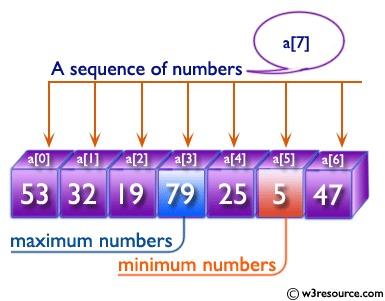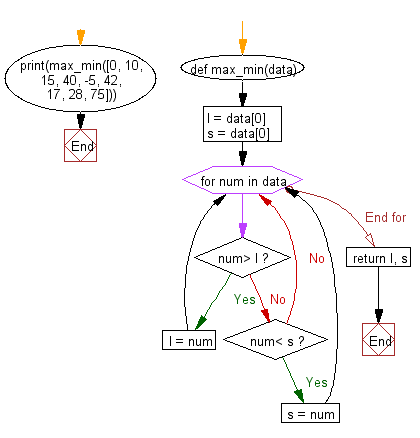Python: Find the maximum and minimum numbers from a sequence of numbers
Max and Min Without Built-ins
Write a Python function to find the maximum and minimum numbers from a sequence of numbers.
Note: Do not use built-in functions.
Sample Solution:
Python Code :
# Define a function named 'max_min' that takes a list 'data' as its argument.
def max_min(data):
# Initialize two variables 'l' and 's' with the first element of the 'data' list.
l = data[0] # 'l' is used to keep track of the maximum value.
s = data[0] # 's' is used to keep track of the minimum value.
# Iterate through each number 'num' in the 'data' list.
for num in data:
# Check if the current number 'num' is greater than the current maximum 'l'.
if num > l:
l = num # If 'num' is greater, update 'l' with 'num'.
# Check if the current number 'num' is smaller than the current minimum 's'.
elif num < s:
s = num # If 'num' is smaller, update 's' with 'num'.
# Return the maximum 'l' and minimum 's' values as a tuple.
return l, s
# Call the 'max_min' function with a list of numbers and print the result.
print(max_min([0, 10, 15, 40, -5, 42, 17, 28, 75]))
Sample Output:
(75, -5)
Pictorial Presentation:

Flowchart:

For more Practice: Solve these Related Problems:
- Write a Python function to find the second maximum and second minimum numbers from a sequence without using built-in functions.
- Write a Python program to find the largest even and smallest odd numbers in a sequence without using min() or max().
- Write a Python function to find the maximum and minimum of a list using recursion.
- Write a Python program to find the maximum difference between any two elements in a list without using built-ins.
Go to:
Previous: Write a Python function to check whether a number is divisible by another number. Accept two integers values form the user.
Next: Write a Python function that takes a positive integer and returns the sum of the cube of all the positive integers smaller than the specified number.
Python Code Editor:
What is the difficulty level of this exercise?
Test your Programming skills with w3resource's quiz.
